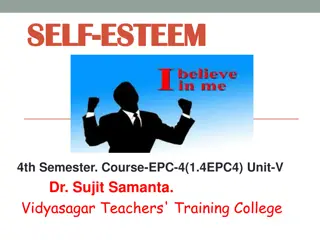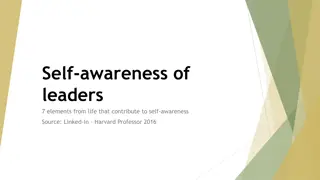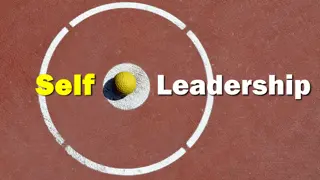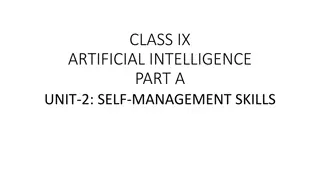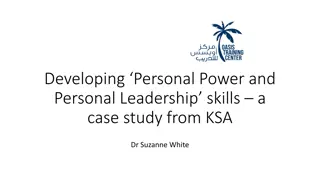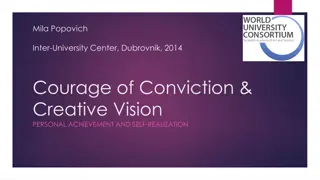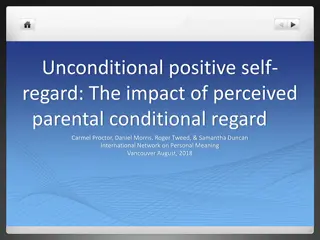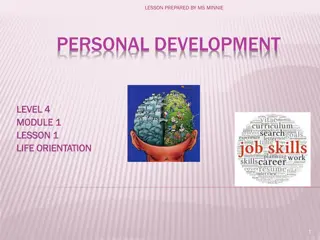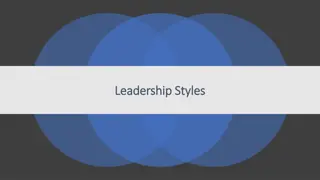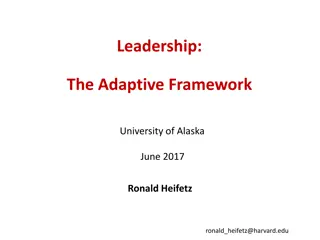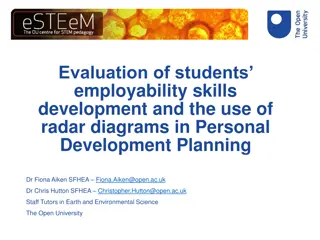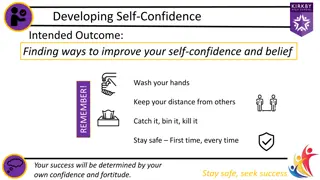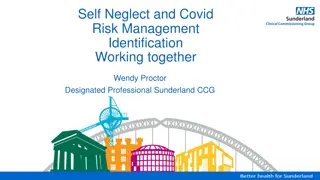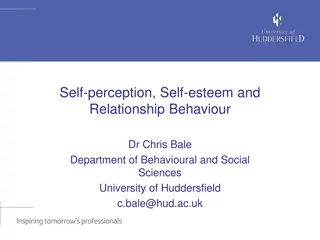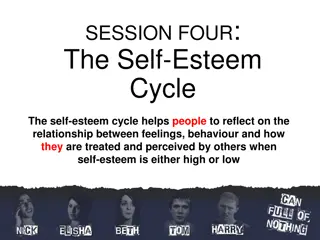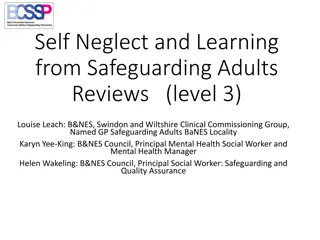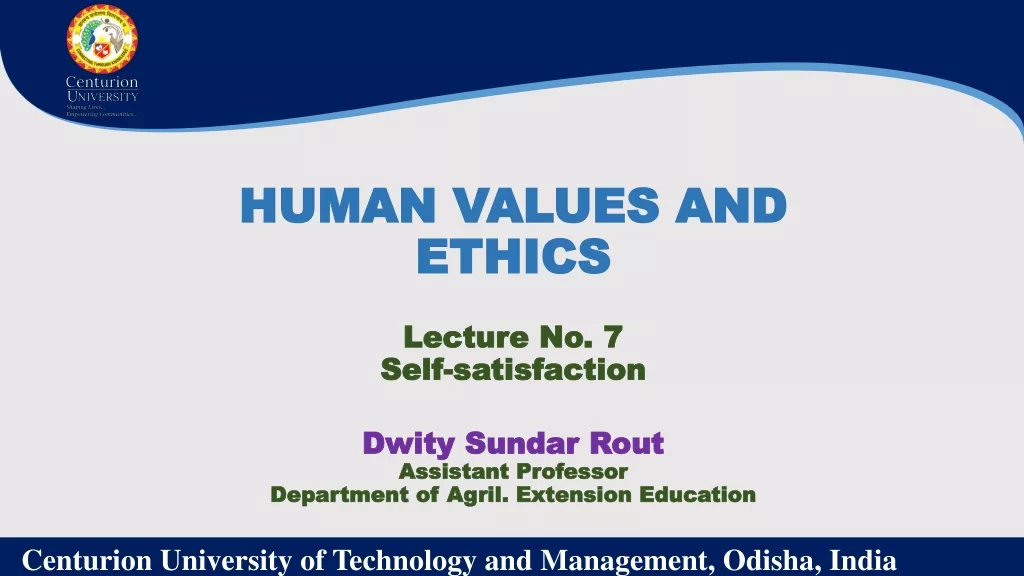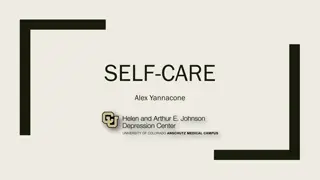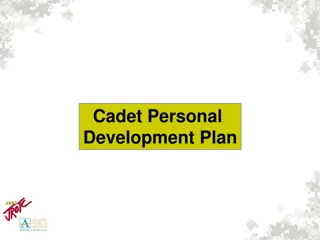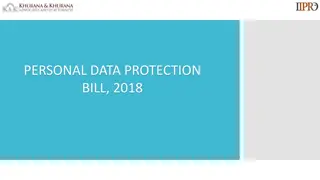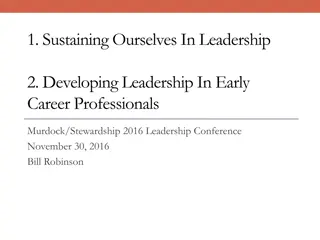Understanding Leadership and Self-Leadership for Personal Development
Leadership is defined as an influence relationship between leaders and followers striving for real change. It involves self-awareness, self-management, and self-development. Self-leadership begins with understanding oneself, motives, and capabilities through self-awareness, ultimately leading to purposeful change and growth.
Download Presentation

Please find below an Image/Link to download the presentation.
The content on the website is provided AS IS for your information and personal use only. It may not be sold, licensed, or shared on other websites without obtaining consent from the author. Download presentation by click this link. If you encounter any issues during the download, it is possible that the publisher has removed the file from their server.
E N D
Presentation Transcript
What is leadership?
What is leadership? an influence relationship among leaders and followers who intend real changes and outcomes that reflect shared purposes. (Richard L. Daft and Patricia G. Lane)
What is leadership? an influence relationship among leaders and followers who intend real changes and outcomes that reflect shared purposes. (Richard L. Daft and Patricia G. Lane)
What is leadership? At the heart of leadership is the influence relationship . . . and the most important influence relationship is the one with yourself.
What is leadership? None of these characteristics requires a title Relationship is more important than a title Title is positional authority Relationship is about granted authority You are a leader All good leadership begins with the leader Have you given yourself permission to seek purposeful change in a meaningful direction?
There are 3 Disciplines to Self- Leadership: Self-Awareness: Knowing who you are and why you are Self-Management: Knowing your insides Self-Development: Knowing how to be a learner and a builder
Self-Awareness Good self-leadership begins with great self-awareness. Requires knowing your makeup Understanding your motives Knowing how you come across
Self-Awareness Your Makeup: Your gifts & abilities Your journey
Self-Awareness Your gifts & abilities God given talents Temperament & personality
Self-Awareness Your journey Formative events & people Successes & failures Key turning points
Self-Awareness Your Motives: Your character
Self-Awareness Your character Who you are on the inside Mental and moral qualities that distinguish you as an individual How you respond to everything
Self-Awareness Knowing How You Come Across: Your presence Your emotional intelligence
Self-Awareness Knowing How You Come Across: Edwin Friedman-A Failure of Nerve-the greatest quality of a leader for the 21st century will be the ability to bring a non- anxious presence into any situation.
Self-Awareness Knowing How You Come Across: Abraham Lincoln said, Reputation is the shadow. Character is the tree.
Self-Awareness Psalm 139 I praise you for I am fearfully and wonderfully made. Wonderful are your works; my soul knows it very well.
Self-Awareness Psalm 139 Search me, O God, and know my heart! Try me and know my thoughts! And see if there be any grievious way in me, and lead me in the way everlasting!
Self-Management Good self-awareness leads to good self-management. Managing your emotions Managing your expectations Managing your health
Self-Management Managing your emotions Depression Anger Fear
Self-Management Depression: The natural response to loss Shows up in confused thinking, loss of interest in work or hobbies, inertia, sleep pattern shifts, and guilt
Self-Management Anger: The natural response of readiness caused by hurt, fear, or frustration. Shows up in explosions, alienation, or isolation
Self-Management Fear: The natural response of concern or regret over unwanted situations. Shows up in explosions, alienation, or isolation
Self-Management The pathway to overcoming these negative emotions begins by naming them They are best healed in community Part of the pathway may be seeking professional help
Self-Management Managing your expectations Of yourself Of others
Self-Management Of Yourself: Not letting your shortcomings hold you back Not beating yourself up when you don t meet your expectations
Self-Management Of Others: There is a balance between meeting other s expectations and not being controlled by them Better to shape expectations rather than be shaped by them
Self-Management Managing your health Adequate sleep Proper diet Moderate use of alcohol and caffeine Adequate exercise Daily dose of positive human contact
Self-Management Managing your health Avoid: Negative people Disorganization Second guessing decisions
Self-Management Proverbs 25:28 A person without self-control is like a city broken into and left without walls.
Self-Development Good self-awareness leads to good self-development. Unlearning Lifelong Learning Building on Who You Are Avoiding Burnout Overcoming Failure
Self-Development Unlearning A leader must be willing to put yesterday s ideas, attitudes and approaches under the knife of new insights and new challenges. (Reggie McNeal)
Self-Development Lifelong Learning Make a commitment to this It will keep you fresh It will help you to remain humble
Self-Development Building On Who You Are A sense of accomplishment Glimpses of excellence Quick learning Sustained growth Feedback
Self-Development Avoiding Burnout Our strengths and our personality traits also reflect our needs If we do not get to use them we court burnout
Self-Development Overcoming Failure Admit the mistake Accept responsibility Make restitution Reassess life vision and values
Self-Development Overcoming Failure Mourn your loss Move to closure Accept direction Establish new behaviors & accountabilities
The Narrative of Your Contribution I believe you were created for a purpose. And I believe purpose flows out of creation. No one creates without a purpose in mind.
The Narrative of Your Contribution Genesis 1:1 In the beginning God created . . . Light, Heavens, Land, Vegetation, Sun & Stars, Flying & Sea Creatures, Land Creatures . . . And Mankind
The Narrative of Your Contribution Genesis 1:28 The God said, Let us make man . . . Let them have dominion. We were created to multiply and reign . . . Literally to grow/increase and reign over/steward well
The Narrative of Your Contribution Purpose speaks to why something is done Purpose speaks to aim and intention
The Narrative of Your Contribution You were created for a purpose that you might make your best contribution for flourishing. If there truly is a grand meta-narrative, then your story matters!





